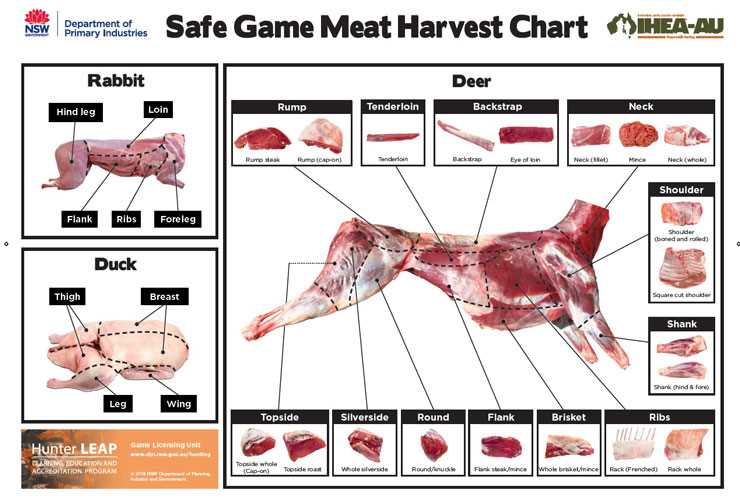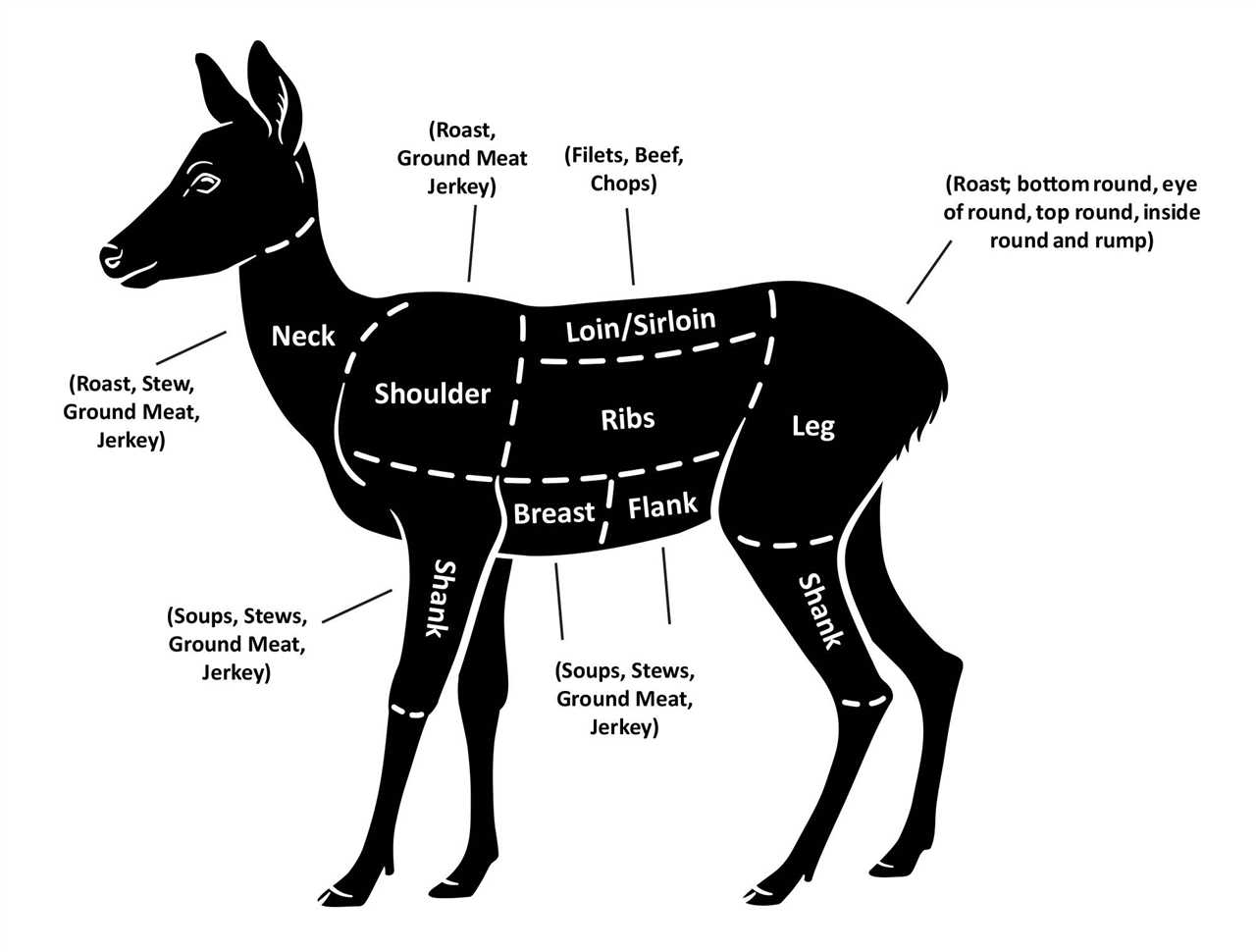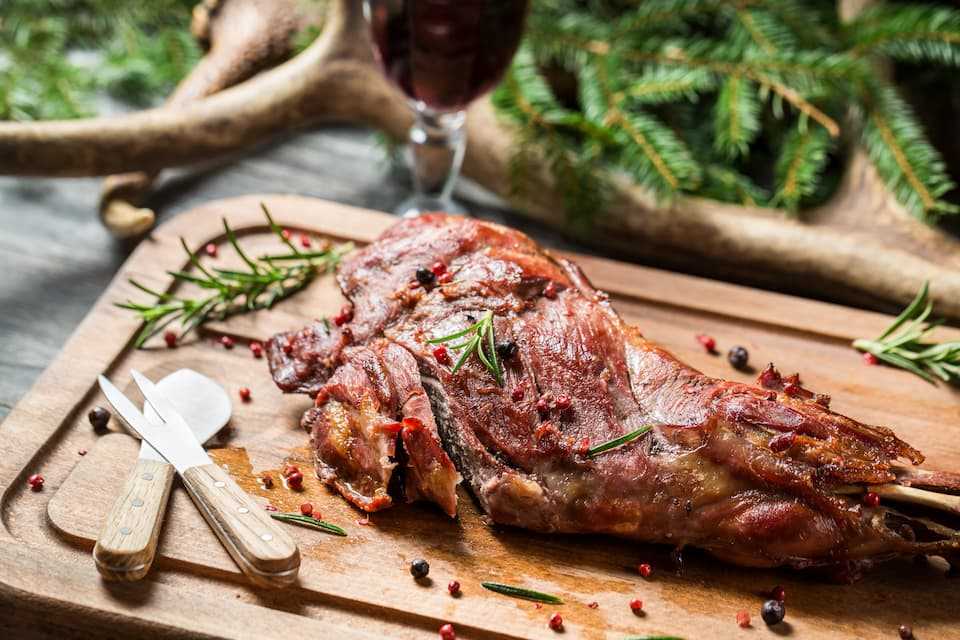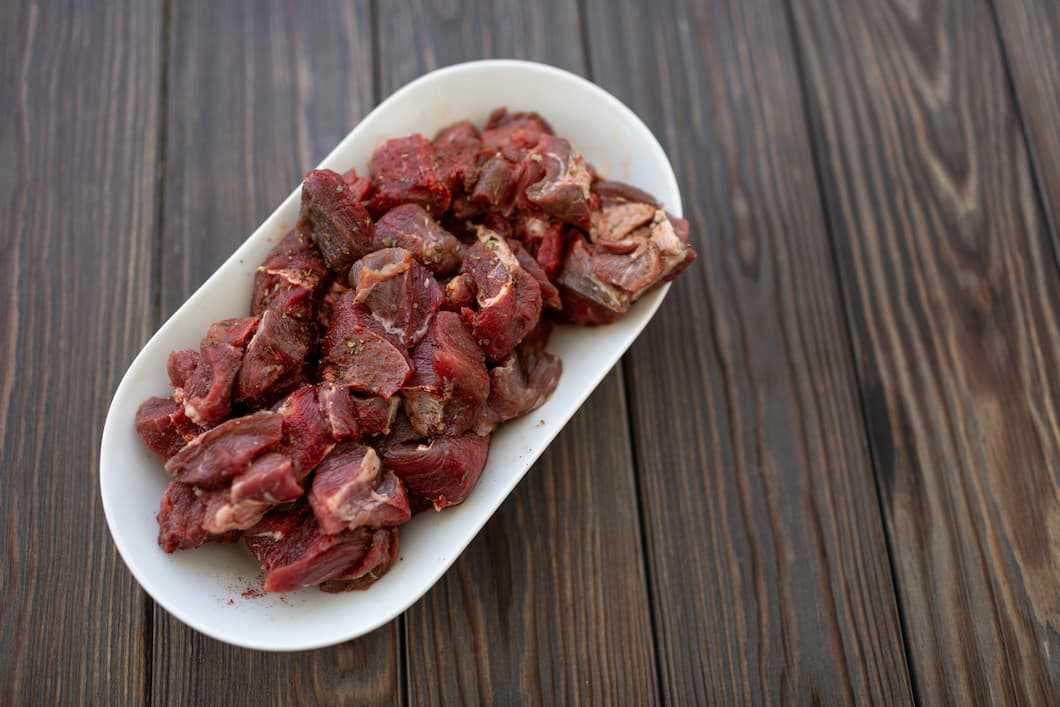Contents
Understanding the Definition and Importance of Game Meat: A Closer Look at its Significance

Game meat, also known as wild game, has been a part of human cuisine since ancient times. It refers to the meat of wild animals that are hunted, rather than being raised on farms like traditional livestock. Game meat is considered a delicacy in many cultures and is known for its unique flavors and textures.
In the world of cuisine, game meat includes a wide variety of animals, such as deer, elk, moose, rabbits, ducks, and even larger game like boars. These animals roam freely in the wild, feeding on natural vegetation, which gives their meat a distinct taste. Due to their active lifestyle and natural diet, game animals tend to have leaner and richer meat compared to domesticated animals.
Hunting is the primary source of acquiring game meat, and it has a long history dating back to the earliest human civilizations. In the past, hunting was essential for survival, but today, it has evolved into a recreational activity. Many hunters take pride in sourcing their own food and enjoy the process of tracking, capturing, and preparing game meat.
The meaning of game meat extends beyond its taste and hunting culture. It represents a connection to nature and a respect for the wild. Consuming game meat can be seen as embracing sustainable and ethical food choices, as it supports the conservation of wildlife habitats and reduces reliance on factory farming.
Game Meat Meaning: Exploring the Definition and Importance of Game Meat

Game meat, also known as venison, is defined as the flesh of animals that are hunted and consumed as food. It is a popular component of various cuisines around the world, particularly in regions where hunting is prevalent. These wild animals are not domesticated like livestock, which gives their meat a distinct flavor and texture that many consider to be a delicacy.
The meaning of game meat goes beyond its culinary appeal. It is deeply rooted in human history and plays a significant role in traditional hunting practices and cultural heritage. Before the advent of modern agriculture, hunting was the primary source of food for many communities. The consumption of game meat was not only a means of sustenance but also a way to connect with nature and honor the animals that provided nourishment.
Today, game meat continues to hold importance, albeit in a different context. While it may not be a staple in most diets, it is still cherished for its unique taste and nutritional value. Game meat is often praised for being leaner and lower in fat compared to conventionally raised livestock. It is also rich in essential nutrients such as protein, iron, and omega-3 fatty acids.
The cooking of game meat requires special techniques and considerations due to its distinct characteristics. The meat can be tougher and leaner than other types of meat, requiring longer cooking times or marinating to enhance tenderness. The presence of natural flavors and aromas in game meat can be further enhanced with herbs, spices, and marinades.
Furthermore, the consumption of game meat can have positive environmental impacts. It promotes sustainable hunting practices by utilizing the existing population of animals, which helps control their numbers in ecosystems where they might otherwise become overpopulated. By incorporating game meat into our diets, we can support conservation efforts and maintain biodiversity.
In conclusion, game meat holds both symbolic and practical significance. Its meaning goes beyond being a source of nourishment – it represents our connection to the wild, our culinary heritage, and our responsibility as stewards of the environment. Whether enjoyed as a special treat or as a part of cultural traditions, game meat continues to be a valued and cherished component of our gastronomic experiences.
What is Game Meat?

Game meat refers to the meat of wild animals that are hunted for sport or food. It is a popular cuisine in many cultures, where hunting is a common practice. Game meat can come from a variety of animals, including deer, elk, moose, wild boar, rabbit, and even birds such as quail and pheasant.
The term “game” in game meat refers to animals that are hunted for pleasure or food. In many countries, the meaning of game meat is strictly regulated, and it can only be obtained from animals that have been legally hunted. This ensures that the population of wild animals is not depleted and that hunting is done in a sustainable manner.
Game meat is known for its distinct flavor and leaner texture compared to meat from domesticated animals. The animals in the wild have more varied diets and tend to be more active, which results in meat that is flavorful and often darker in color. The cooking methods for game meat also differ, as it requires careful preparation to ensure tenderness.
In many culinary traditions, game meat is considered a delicacy and is used in a variety of dishes. It is often used in hearty stews, sausages, and roasts. The unique flavors of game meat can enhance the taste of a dish and provide a different culinary experience.
Game meat has both historical and cultural significance. It has been consumed by humans for thousands of years and was an essential part of early diets. In some cultures, hunting game is seen as a traditional activity that connects people with nature and provides a sense of self-sufficiency.
Overall, game meat offers a unique culinary experience and allows people to connect with the natural world through hunting and cooking. It is a testament to the diverse and rich food culture present across different regions and societies.
Understanding the Basics of Game Meat
One of the key characteristics of game meat is its distinct taste. Since these animals roam freely and feed on a varied diet, their meat tends to have a richer flavor compared to traditional meats like beef or chicken. This distinct flavor makes game meat a delicacy in many culinary traditions.
The cooking methods for game meat also vary depending on the type of animal and the desired flavor. Some game meats, like venison or rabbit, are lean and benefit from quick cooking methods like grilling or sautéing to retain their tender texture. Others, such as boar or duck, have a higher fat content and can be roasted or slow-cooked to bring out their natural flavors.
In addition to its unique taste, game meat is often praised for its nutritional value. It is typically leaner than other meats, making it a good source of protein without excessive fat. Game meat is also rich in essential vitamins and minerals, particularly iron and zinc, which are important for overall health and wellbeing.
However, it is important to note that game meat can also present some challenges. Since these animals are hunted in the wild, their meat may require special handling and preparation techniques to ensure food safety. It is crucial to properly clean and store game meat to reduce the risk of contamination or foodborne illnesses.
In conclusion, game meat is a unique and flavorful addition to any cuisine. Its wild origins, distinct taste, and nutritional benefits make it a sought-after delicacy. Understanding the basics of game meat can help you appreciate its significance and explore new culinary possibilities.
Differentiating Game Meat from Other Types of Meat

Game meat refers to the meat of animals that are hunted in the wild rather than being raised on farms. Hunting has been a popular activity for centuries, with people seeking wild game as a means of sustenance and survival. In recent times, however, hunting game has also become a recreational activity, with enthusiasts enjoying the thrill of the hunt as well as the unique flavors and textures that game meat offers.
One of the key characteristics that differentiates game meat from other types of meat is its source. While most meat comes from animals that have been raised specifically for consumption, game meat comes from animals that live freely in their natural habitat. This wild environment contributes to the unique taste and texture of game meat, as the animals have a higher level of activity and consume a diverse diet.
Another significant difference is the way game meat is cooked. Due to the distinct qualities of game meat, it often requires different cooking methods compared to other types of meat. Game meat is typically leaner and has a stronger flavor, which means it can easily become dry and tough if not cooked properly. As a result, it is common to see game meat being cooked using techniques such as sous vide or slow roasting, which help retain moisture and enhance tenderness.
The meaning of game meat goes beyond its physical attributes and cooking methods. Game meat is often considered a delicacy in many cuisines around the world, symbolizing a connection to nature and the adventure of hunting. It is often associated with gourmet dining and is featured in many high-end restaurants. The flavors and textures of game meat offer a unique sensory experience that can’t be replicated with other types of meat.
In conclusion, game meat holds a special place in the culinary world, standing apart from other types of meat due to its source, cooking methods, and cultural significance. Whether you enjoy the adventure of hunting or simply appreciate the flavors of this wild delicacy, game meat offers a distinct experience that adds diversity to the world of cuisine.
The Significance of Game Meat

Game meat holds a special place in the culinary world as a delightful delicacy. It refers to the meat obtained from animals that are hunted in the wild, such as deer, rabbit, or pheasant. The meaning of game meat goes beyond its taste, as it reflects the ancient tradition of hunting for sustenance.
Hunting game for meat has been a significant part of human history. In the past, it was an essential source of food for sustenance. Today, hunting game has evolved into a recreational activity, but its significance remains. Game meat is considered a luxury ingredient, usually found in high-end restaurants and gourmet cuisine.
The distinct flavor and texture of game meat make it highly sought after by both professional chefs and adventurous home cooks. Game animals have a varied diet and live an active lifestyle in the wild, which contributes to their unique taste. The lean and tender nature of game meat provides a unique culinary experience.
Another significant aspect of game meat is its sustainable nature. The hunting of game animals is carefully regulated and managed to ensure their populations remain healthy. This helps preserve the balance of ecosystems and prevents overpopulation. By consuming game meat, individuals contribute to the conservation of wildlife.
In addition to its culinary and conservation significance, game meat holds cultural importance in many regions. It is often associated with traditional dishes and celebrated in festivals and events. Game meat is often prepared using ancient recipes and cooking techniques, passed down through generations, adding to its cultural value.
In conclusion, game meat holds a special place in the world of cuisine, combining flavors, traditions, and sustainability. It represents a connection to the wild and to our ancestral roots. By indulging in the delicacy of game meat, individuals can experience the rich flavors and cultural significance it brings.
Nutritional Value of Game Meat

Game meat refers to the meat of wild animals that is commonly used in various cuisines around the world. The unique cooking method and quality of game meat give it a special meaning in the culinary world, making it a sought-after delicacy among food enthusiasts.
When it comes to nutrition, game meat offers several benefits. Compared to traditional meats like beef and pork, game meat tends to be leaner and lower in fat. This makes it a healthier option for those looking to reduce their fat intake without compromising on taste.
In addition to being leaner, game meat is also rich in protein, making it a great choice for individuals following high-protein diets. Protein is essential for the growth and repair of tissues, as well as for the production of enzymes and hormones in the body.
Furthermore, game meat is a good source of essential vitamins and minerals. It often contains higher levels of iron, zinc, and vitamin B12 compared to domesticated meats. Iron is important for the production of red blood cells, while zinc plays a key role in immune function and wound healing. Vitamin B12 is necessary for proper brain function and the formation of red blood cells.
Another nutritional advantage of game meat is its higher concentration of omega-3 fatty acids. These healthy fats have been linked to various health benefits, including reduced inflammation, improved heart health, and enhanced brain function.
However, it is important to note that the nutritional value of game meat can vary depending on the specific animal and its diet. For example, game meat from animals that feed on a diverse range of plants may contain higher levels of beneficial nutrients compared to those that feed on a limited diet.
To summarize, game meat offers a range of nutritional benefits due to its lean nature and high protein content. It is a great source of essential vitamins, minerals, and healthy fats, making it a valuable addition to a balanced diet.
| Nutrient | 100g of Game Meat |
|---|---|
| Protein | Xg |
| Fat | Xg |
| Iron | Xmg |
| Zinc | Xmg |
| Vitamin B12 | Xµg |
Environmental Benefits of Consuming Game Meat
The consumption of game meat not only holds cultural and gastronomic meaning, but it also has significant environmental benefits. Unlike farmed animals, game animals can roam freely in their natural habitats, contributing to the preservation of ecosystems and biodiversity.
Game animals are typically not intensively farmed, which means they have a smaller carbon footprint compared to livestock raised for meat production. They require less land, water, and feed, making them a more sustainable choice for protein consumption.
Cooking game meat is often considered a delicacy in many cuisines around the world. It offers a unique taste and texture that is distinct from traditionally farmed animals. This variety in flavors encourages culinary diversity and reduces our reliance on conventional livestock.
Furthermore, hunting game animals helps to control their populations and maintain a balance in the wild. Without natural predators, some game species can overpopulate and cause damage to their habitats. Controlled hunting not only ensures the welfare of these animals but also helps conserve their natural habitats.
By choosing game meat as a part of our diet, we can support sustainable practices and promote more ethical and environmentally conscious food choices. It allows us to reconnect with the wild and appreciate the natural flavors and benefits that game meat offers.

A skilled hunter, dedicated conservationist, and advocate for ethical practices. Respected in the hunting community, he balances human activity with environmental preservation.
